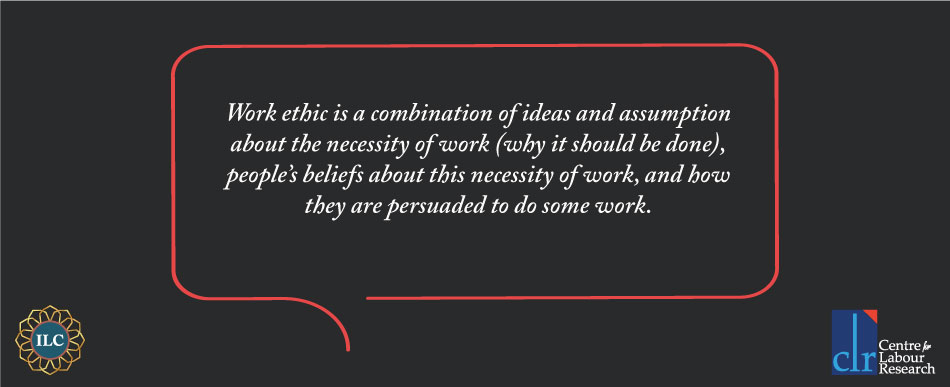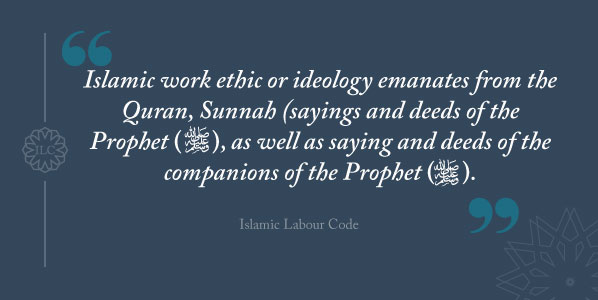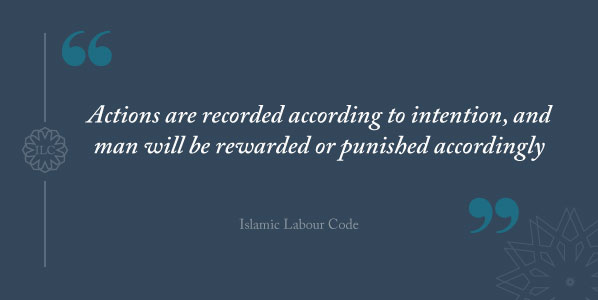Work Ethic and Islam

 Islamic work ethic or ideology emanates from the Quran, Sunnah (sayings and deeds of the Prophet (ﷺ), as well as saying and deeds of the companions of the Prophet (ﷺ). The Quran expresses its work ethic in the following words: “And there is nothing for a person except what he strives for” (53:39).[2] In another verse, the Quran treats work as a source of honour (Say: Work and Allah will see your work [09:105]). Earning one’s livelihood is so important that the Quran refers to workers and fighters in the cause of Allah in the same verse. (73:20)[3]
The Prophet (ﷺ) stressed that anxiety and stress (hard work) in earning the income to support one’s family leads to the atonement of sins[4] and that the “best earnings are those that are earned by a person through his own hands”.[5] In the same tone, Umar (RA), the companion and the second Caliph, expressed that “it is quite unbecoming of a Muslim not to make due effort to earn his bread and butter and simply praying that God grant him food”.[6]
The seeking of halal (legitimate) earnings is a duty after obligatory prayers and other duties, in line with a hadith.[7] Although it is not one of the five pillars of Islam, work is a duty for all people, and it is a kind of worship (ibadah) (Who is better in speech than one who calls [men] to God and works righteousness, 41:33). Islam has no room for asceticism, and complete devotion to worship does not constitute a valid reason for not working. The Prophet (ﷺ) once saw a man worshipping in the mosque all the time. He asked who was financially supporting this person and people replied that some of them were helping him. He said that those people assisting the worshipper were better than him.[8] Work is also regarded as a form of Jihad (holy war), and a person who works hard to make provisions for his children, old parents, or who earns a living for him or herself is considered a mujahid in the way of God.[9]
Islamic work ethic or ideology emanates from the Quran, Sunnah (sayings and deeds of the Prophet (ﷺ), as well as saying and deeds of the companions of the Prophet (ﷺ). The Quran expresses its work ethic in the following words: “And there is nothing for a person except what he strives for” (53:39).[2] In another verse, the Quran treats work as a source of honour (Say: Work and Allah will see your work [09:105]). Earning one’s livelihood is so important that the Quran refers to workers and fighters in the cause of Allah in the same verse. (73:20)[3]
The Prophet (ﷺ) stressed that anxiety and stress (hard work) in earning the income to support one’s family leads to the atonement of sins[4] and that the “best earnings are those that are earned by a person through his own hands”.[5] In the same tone, Umar (RA), the companion and the second Caliph, expressed that “it is quite unbecoming of a Muslim not to make due effort to earn his bread and butter and simply praying that God grant him food”.[6]
The seeking of halal (legitimate) earnings is a duty after obligatory prayers and other duties, in line with a hadith.[7] Although it is not one of the five pillars of Islam, work is a duty for all people, and it is a kind of worship (ibadah) (Who is better in speech than one who calls [men] to God and works righteousness, 41:33). Islam has no room for asceticism, and complete devotion to worship does not constitute a valid reason for not working. The Prophet (ﷺ) once saw a man worshipping in the mosque all the time. He asked who was financially supporting this person and people replied that some of them were helping him. He said that those people assisting the worshipper were better than him.[8] Work is also regarded as a form of Jihad (holy war), and a person who works hard to make provisions for his children, old parents, or who earns a living for him or herself is considered a mujahid in the way of God.[9]
 Compared with hard work, inertia or parasitism is highly frowned upon and disliked in Islamic literature. Islam persuades people to give charity while on the other hand calls for hard work as mentioned in a hadith that “It is better that a person should take a rope and bring a bundle of wood on his back to sell so that Allah may preserve his honour than that he should beg from people (regardless of) whether they give him or refuse him”.[10] In some other hadith, the Prophet (ﷺ) said that charity is not legitimate for an able-bodied person.[11]
Islam also allows for migration or change of workplace if work is not available locally. In a hadith, the Prophet (ﷺ) asserted that people are allowed to migrate to other countries in search of livelihood or family welfare. This is also supported in a verse of the Quran (04:97–100). From this verse, it appears that Allah appreciates migration for one’s betterment (whether it is spiritual or worldly because Islam does not differentiate between theological and secular activities). Migration may also become a necessity for some when one’s life and beliefs are in danger.
The logic behind work in Islam is to achieve self-reliance and self-sufficiency. As the below-mentioned ahadith show, Islam asks people to have pride in their work even when they are receiving little in remuneration. In another hadith, we find out that the Prophet (ﷺ) emphasizes the importance of earning and then giving examples that even Prophets (AS) earned for themselves.
“No one has ever eaten any food that is better than eating what his hands have earned. And indeed, the Prophet of Allah, Dawud (AS), would eat from the earnings of his hands”.[12]
“The Prophet Zakariya (AS) was a carpenter”.[13]
“The Prophet (ﷺ) said, “Allah did not send any prophet, but they shepherded sheep”. His companions asked him, “Did you do the same?” The Prophet (ﷺ) replied, “Yes, I used to shepherd the sheep of the people of Makkah for some Qirats. (i.e., coins of copper)”.[14]
In another instance, when the people of Camel and Sheep were vying with one another for glory, the Prophet (ﷺ) said the following: “Musa (AS) was sent, and he was a shepherd. Dawud (AS) was sent, and he was a shepherd. I was sent, and I used to herd sheep for my people at Ajyad”.[15]
Despite all this emphasis on hard work, Islam still focuses on the importance of the hereafter. The belief is that the actual reward of efforts will be given only in the afterlife and not necessarily in this world. Moreover, Islam focuses more on intentions and hard work than on results, as recorded in a tradition of the Prophet (ﷺ) “actions are recorded according to intention, and man will be rewarded or punished accordingly”.[16] For example, the real punishment for lousy treatment of workers would be in the hereafter.[17] However, the state is required to make rules to provide these protections to workers. At the same time, employment creation is important in Islam as the Quran notes that the mere reason of bestowing some with more resources than others is to create employment opportunities.[18]
Compared with hard work, inertia or parasitism is highly frowned upon and disliked in Islamic literature. Islam persuades people to give charity while on the other hand calls for hard work as mentioned in a hadith that “It is better that a person should take a rope and bring a bundle of wood on his back to sell so that Allah may preserve his honour than that he should beg from people (regardless of) whether they give him or refuse him”.[10] In some other hadith, the Prophet (ﷺ) said that charity is not legitimate for an able-bodied person.[11]
Islam also allows for migration or change of workplace if work is not available locally. In a hadith, the Prophet (ﷺ) asserted that people are allowed to migrate to other countries in search of livelihood or family welfare. This is also supported in a verse of the Quran (04:97–100). From this verse, it appears that Allah appreciates migration for one’s betterment (whether it is spiritual or worldly because Islam does not differentiate between theological and secular activities). Migration may also become a necessity for some when one’s life and beliefs are in danger.
The logic behind work in Islam is to achieve self-reliance and self-sufficiency. As the below-mentioned ahadith show, Islam asks people to have pride in their work even when they are receiving little in remuneration. In another hadith, we find out that the Prophet (ﷺ) emphasizes the importance of earning and then giving examples that even Prophets (AS) earned for themselves.
“No one has ever eaten any food that is better than eating what his hands have earned. And indeed, the Prophet of Allah, Dawud (AS), would eat from the earnings of his hands”.[12]
“The Prophet Zakariya (AS) was a carpenter”.[13]
“The Prophet (ﷺ) said, “Allah did not send any prophet, but they shepherded sheep”. His companions asked him, “Did you do the same?” The Prophet (ﷺ) replied, “Yes, I used to shepherd the sheep of the people of Makkah for some Qirats. (i.e., coins of copper)”.[14]
In another instance, when the people of Camel and Sheep were vying with one another for glory, the Prophet (ﷺ) said the following: “Musa (AS) was sent, and he was a shepherd. Dawud (AS) was sent, and he was a shepherd. I was sent, and I used to herd sheep for my people at Ajyad”.[15]
Despite all this emphasis on hard work, Islam still focuses on the importance of the hereafter. The belief is that the actual reward of efforts will be given only in the afterlife and not necessarily in this world. Moreover, Islam focuses more on intentions and hard work than on results, as recorded in a tradition of the Prophet (ﷺ) “actions are recorded according to intention, and man will be rewarded or punished accordingly”.[16] For example, the real punishment for lousy treatment of workers would be in the hereafter.[17] However, the state is required to make rules to provide these protections to workers. At the same time, employment creation is important in Islam as the Quran notes that the mere reason of bestowing some with more resources than others is to create employment opportunities.[18]
[1] Bayat, A. 1992. Work ethics in Islam: A comparison with Protestantism. The Islamic Quarterly 36 (01):05– 27 [2] This theme is repeated in another verse, “There is guaranteed share for those who seek and endeavour”. (41:10)
وَجَعَلَ فِيهَا رَوَاسِيَ مِن فَوْقِهَا وَبَارَكَ فِيهَا وَقَدَّرَ فِيهَا أَقْوَاتَهَا فِي أَرْبَعَةِ أَيَّامٍ سَوَاءً لِّلسَّائِلِينَ
[3] “Others will be travelling in the land to look for Allah’s bounty and (still some) others will be fighting in the way of Allah”.وَآخَرُونَ يَضْرِبُونَ فِي الْأَرْضِ يَبْتَغُونَ مِنْ فَضْلِ اللَّهِ وَآخَرُونَ يُقَاتِلُونَ فِي سَبِيلِ اللَّهِ
[4] (Majma’uz Zawaid: 6239)اِنَّ مِنَ الذُّنُوْبِ ذُنُوْبًا، لاَ تُکَفِّرُہَا الصَّلٰوةُ وَلاَ الصِّیَامُ وَلاَ الْحَجُّ وَلاَ الْعُمْرَةُ، قَالُوْا: فَمَا یُکَفِّرُہَا یَا رَسُوْلَ اللّٰہِ؟! قَالَ: اَلْہُمُوْمُ فِيْ طَلَبِ الْمَعِیْشَةِ
[5] The Prophet (ﷺ) said: “No man earns anything better than that which he earns with his own hands”. (Sunan Ibn Majah: 2138)مَا كَسَبَ الرَّجُلُ كَسْبًا أَطْيَبَ مِنْ عَمَلِ يَدِهِ
In another instance, the Prophet (ﷺ) said: “Every Muslim must give sadaqah. He was asked how should one act if he had nothing to give and he said that he should labour with his hands to earn benefit for himself and give sadaqah from that. The companions, asked, “What if he cannot do it?” The prophet said “He should help one who is in need and distressed.” They asked again what would happen if he could not do that and he said that he should enjoin what is good and pious. He was asked, “If he cannot do that too then what should he do?” The prophet said, “He should refrain from evil (making sure that he does not hurt anyone) and that would be sadaqah for him”. (Adab al Mufrad: 225)قَالَ النَّبِيُّ صلى الله عليه وسلم: عَلَى كُلِّ مُسْلِمٍ صَدَقَةٌ، قَالُوا: فَإِنْ لَمْ يَجِدْ؟ قَالَ: فَيَعْتَمِلُ بِيَدَيْهِ، فَيَنْفَعُ نَفْسَهُ، وَيَتَصَدَّقُ، قَالُوا: فَإِنْ لَمْ يَسْتَطِعْ، أَوْ لَمْ يَفْعَلْ؟ قَالَ: فَيُعِينُ ذَا الْحَاجَةِ الْمَلْهُوفَ، قَالُوا: فَإِنْ لَمْ يَفْعَلْ؟ قَالَ: فَيَأْمُرُ بِالْخَيْرِ، أَوْ يَأْمُرُ بِالْمَعْرُوفِ، قَالُوا: فَإِنْ لَمْ يَفْعَلْ؟ قَالَ: فَيُمْسِكُ عَنِ الشَّرِّ، فَإِنَّهُ لَهُ صَدَقَةٌ
[6] At another occasion, Umar said “to die while striving in my work hoping for the bounty of God is even better to me than being killed in the Holy war for the sake of God”. (Al-Shaibani) (Quoted from El-Ashker and Wilson (2006, 107). [7] “The seeking of a halal earning is the (next) Fard (duty) after the Fard (Salah)”. (Majma’uz Zawaid, vol.10 pg.291 & Faydul Qadir, hadith: 5271; Bayhaqi Shuaab ul Iman: 8741)طلب كسب الحلال فريضة بعد الفريضة
The Prophet said at another place: “Earning halal livelihood is binding (wajib) on every Muslim”. (Majma’uz Zawaid, vol.10 pg.291 & Targhib, vol.2 pg.546)طلب الحلال واجب على كل مسلم
[8] Musnad Ahmad[9] Tabarani, Mujam ul Kabir:282; Bayhaqi Shuaab ul Iman: 4853 [10] (Riyad as-Salihin: 539)
لأَنْ يَأْخُذَ أَحَدُكُم أَحبُلَهُ، ثُمَّ يَأْتِيَ الجَبَلَ، فَيَأْتِي بحُزْمَةٍ مِن حَطَبٍ عَلى ظَهْرِهِ فَيَبيعَهَا، فَيَكُفَّ اللَّه بِهَا وَجْهَهُ؛ خَيْرٌ لَهُ مِنْ أَن يَسأَلَ النَّاسَ أَعْطَوْهُ، أَوْ مَنَعُوهُ
[11] “Charity is not permissible for a rich person, or for one who is strong and healthy”. (Sunan Ibn Majah: 1839)لاَ تَحِلُّ الصَّدَقَةُ لِغَنِيٍّ وَلاَ لِذِي مِرَّةٍ سَوِيٍّ
[12] (Sahih al-Bukhari: 2072).مَا أَكَلَ أَحَدٌ طَعَامًا قَطُّ خَيْرًا مِنْ أَنْ يَأْكُلَ مِنْ عَمَلِ يَدِهِ، وَإِنَّ نَبِيَّ اللَّهِ دَاوُدَ ـ عَلَيْهِ السَّلاَمُ ـ كَانَ يَأْكُلُ مِنْ عَمَلِ يَدِهِ
[13] (Sahih Muslim:2379).كَانَ زَكَرِيَّاءُ نَجَّارًا
[14] (Sahih al-Bukhari: 2262).مَا بَعَثَ اللَّهُ نَبِيًّا إِلاَّ رَعَى الْغَنَمَ . فَقَالَ أَصْحَابُهُ وَأَنْتَ فَقَالَ نَعَمْ كُنْتُ أَرْعَاهَا عَلَى قَرَارِيطَ لأَهْلِ مَكَّةَ
[15] (Adab al Mufrad: 577)تَفَاخَرَ أَهْلُ الإِبِلِ وَأَصْحَابُ الشَّاءِ، فَقَالَ النَّبِيُّ صلى الله عليه وسلم: بُعِثَ مُوسَى وَهُوَ رَاعِي غَنَمٍ، وَبُعِثَ دَاوُدُ وَهُوَ رَاعٍ، وَبُعِثْتُ أَنَا وَأَنَا أَرْعَى غَنَمًا لأَهْلِي بِأَجْيَادِ
[16] “The reward of deeds depends upon the intentions and every person will get the reward according to what he has intended”. (Sahih Bukhari: 1)إِنَّمَا الأَعْمَالُ بِالنِّيَّاتِ، وَإِنَّمَا لِكُلِّ امْرِئٍ مَا نَوَى
[17] The Prophet (ﷺ) is quoted as saying: “Those who ill-treat their employees will find the paradise gates shut to their faces”. (Majma Uz Zawaid) The Messenger of Allah (ﷺ) said: “No one who mistreats his slaves (workers) will enter Paradise. A man said: O Messenger of Allah (ﷺ), didn’t you tell us that this ummah is the greatest in numbers of slaves and orphans? He said: `Yes, so treat them kindly as you treat your children and feed them from what you eat. They said: What could benefit us in this world, O Messenger of Allah? He said: “A good horse which you keep ready for fighting for the sake of Allah and a slave to take care of you. If he prays (becomes Muslim), then he is your brother, if he prays, then he is your brother”. (Musnad Ahmad: 75)قَالَ رَسُولُ اللَّهِ صَلَّى اللَّهُ عَلَيْهِ وَسَلَّمَ لَا يَدْخُلُ الْجَنَّةَ سَيِّئُ الْمَلَكَةِ فَقَالَ رَجُلٌ يَا رَسُولَ اللَّهِ أَلَيْسَ أَخْبَرْتَنَا أَنَّ هَذِهِ الْأُمَّةَ أَكْثَرُ الْأُمَمِ مَمْلُوكِينَ وَأَيْتَامًا قَالَ بَلَى فَأَكْرِمُوهُمْ كَرَامَةَ أَوْلَادِكُمْ وَأَطْعِمُوهُمْ مِمَّا تَأْكُلُونَ قَالُوا فَمَا يَنْفَعُنَا فِي الدُّنْيَا يَا رَسُولَ اللَّهِ قَالَ فَرَسٌ صَالِحٌ تَرْتَبِطُهُ تُقَاتِلُ عَلَيْهِ فِي سَبِيلِ اللَّهِ وَمَمْلُوكٌ يَكْفِيكَ فَإِذَا صَلَّى فَهُوَ أَخُوكَ
[18] “It is We who distribute their means of livelihood among them in the life of this world, and raise some of them by degrees above others, to the end that they might avail themselves of one another’s help”.نَحْنُ قَسَمْنَا بَيْنَهُمْ مَعِيشَتَهُمْ فِي الْحَيَاةِ الدُّنْيَا وَرَفَعْنَا بَعْضَهُمْ فَوْقَ بَعْضٍ دَرَجَاتٍ لِيَتَّخِذَ بَعْضُهُمْ بَعْضًا سُخْرِيًّا
